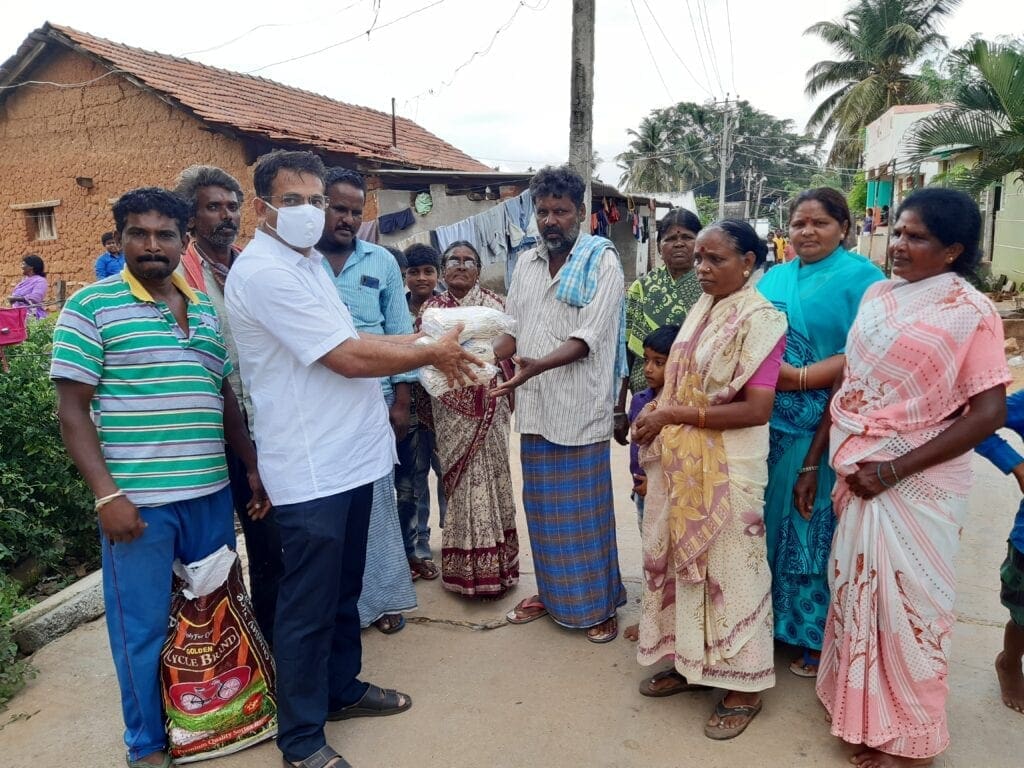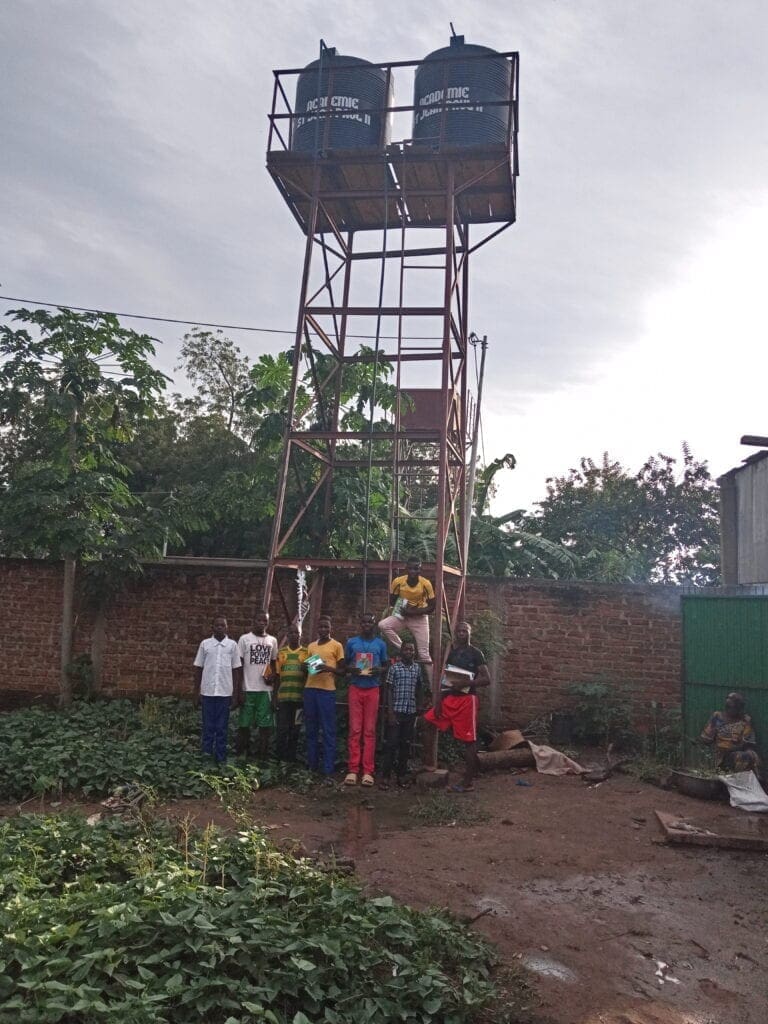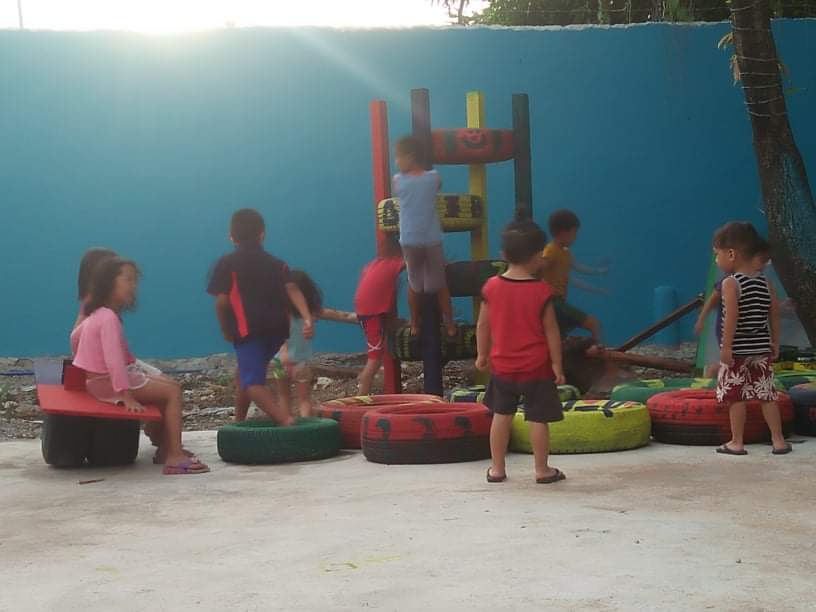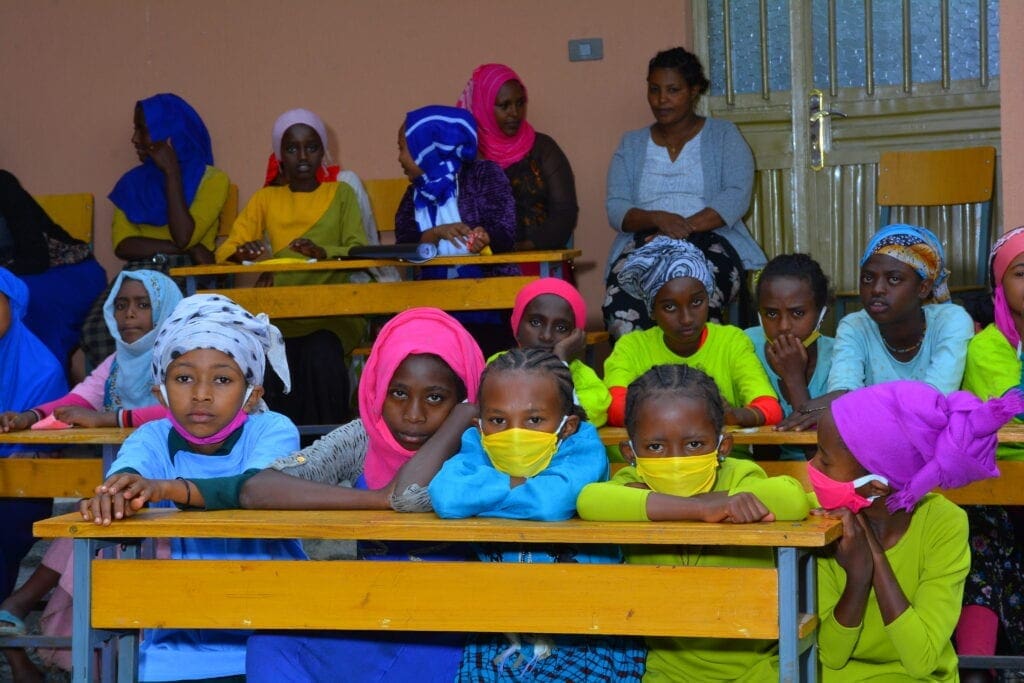EXECUTIVE SUMMARY

Fr. Joseph (Shalby) Thelliankal, C.M. of DePaul Apparel presenting protective masks for COVID 19 project in Belwady Village, September, 2020
The Mission Impact Training Forum (MIT) event with COVIAM region was a success according to the feedback of the participants. Overwhelmingly, the topics covered were relevant to the participants. Due to the pandemic, the presentation was adapted to a virtual Forum via Zoom Conference. Despite this, the fourteen confreres and two lay women retained the bilingual content, delivered in English and interpreted in French.
The virtual Forum took place over an 8-week period with 1-2 sessions a week of three hours each from May 26 – July 14, 2020. Eight sessions were presented covering a wide range of training topics, including extensive coverage of skills needed in grant writing and project management. The VSO had responsibility for planning the Forum, with assistance from Fr. Lord Winner, C.M.F., Ph.D.
The Forum was conducted by the VSO with training sessions presented by Fr. Winner. Multiple participant surveys provided baseline data on skills and competencies. The gaps identified will be the basis for future trainings. As such, the Forum and the lessons learned will serve as a model for future Forum events in other regions.
FEEDBACK FROM FORUM PARTICIPANTS
A large amount of constructive feedback was obtained from the participants to improve and guide future VSO activities with the regions and the content of those activities. The Pre-Forum Survey covered the following in support of project work: skills and knowledge needed, infrastructure and collaboration with the VSO. The VSO obtained data relevant to a baseline of current interest, project activity, and collaboration with the VSO and in the local context The Future Needs Survey, conducted during the Forum, provided extensive feedback on skills ‘most helpful’ and ‘most needed.’ These included writing, financial, computer, project management, risk assessment and interpersonal skills. Also collected were data on future project types and the challenges faced and support needed to implement a project. The data are detailed in the “Forum on Vincentian Development: Comprehensive Report,” section, 2
“Future Needs Survey.” The VSO Team is confident to have the information needed to conduct follow-up sessions with COVIAM as well as to start planning future Forums with the other regions.
FINANCIAL SUMMARY
| The following table summarizes the income and expenses for the Forum from April 1-August 30, 2020. Project Income | USD |
| St. Barbara Property Tithe 2020 | 24,008.15 |
| Total Income | 24,008.15 |
| Project Expenses | USD |
| Presenter | 5,131.03 |
| French Interpreter | 2,672.97 |
| Salary of Director of M.I.T.* | 15,242.48 |
| Subscription to Zoom Conference | 647.67 |
| Miscellaneous | 179.00 |
| Bank Charges | 135.00 |
| Total Expenses | 24,008.15 |
| *Salary April 1 – August 30, 2020 |
CONCLUSIONS

Chad – Water and tank for minor seminary 2019
In this section, the VSO presents the most salient points that were learned from the preparation, delivery, and the analysis of the data from the pilot Forum in COVIAM. The section concludes with recommendations and a plan for holding future Forum and other related training of project managers.
A. LESSONS LEARNED AND BEST PRACTICES
The Forum on Vincentian Development was the first ever international project management training organized by the VSO. Through this pilot Forum, the VSO learned many lessons that will be adapted as best practices in the section below. Due to the Coronavirus, in-person meetings and especially international travel will have restrictions for the foreseeable future. Meetings and events will continue to be presented online as the main way to train and meet with project managers during the pandemic and beyond, such meetings save on travel expenses. Although there were some glitches in quickly adapting an in-person meeting to a virtual one, it was a successful Forum. We were encouraged by the participants’ consistent attendance and engagement despite unreliable internet and electricity in African countries. This pilot Forum proved that a virtual conference can work. Success requires an assigned and competent technical person to troubleshoot and deal with any issues that arise during the Forum.
The following list describes the best practices for conducting an international bilingual event online, based on lessons learned from this pilot Forum:
1. Consultation and Engagement
Initial and continued consultation and engagement with the Visitors were key for their buy-in. They are the ones who will give the identified confreres the time, the space, and the support to participate in the Forum.
Communication and outreach with the participants to keep them engaged
o Personal reminder emails before each Forum session.
o Personal acknowledgement and greeting to every participant when they entered Zoom.
o Participants were heard – all their questions were acknowledged and answered
2. Pre-Forum Planning
Much time is needed to plan the event. An online event requires more planning and time for planning than an in-person event. The VSO had to quickly adapt and move to convert in-person plans to an online format.
Assemble a team early and have regular meetings so everyone knows their specific roles.
Develop a checklist of what needs to be done with person responsible for its completion and include a timeline.

Phillipines – Children Playing in new Playground
If doing bilingual event, it is critical to have a good interpreter.
Allocate enough time to prepare materials and if in another language, time for the translation and having the materials checked by a native speaker for accuracy. If this is not possible, it is recommended to have the event in one language and then later in a second language to give time for translation.
Hosting a virtual meeting is more time consuming than an in-person meeting.
Check with the participants to get their availability to attend the Forum and if they have access to reliable internet and electricity.
3. Technology
Dedicated team that has specific roles during the event – we had a tech person, someone answering questions, greeter, and someone with access to the presentation slides.
Have several internal practice sessions for the team using the technology and then have a second practice run with the participants so matters can be worked out before the start of the event.
The trainer/speaker/interpreter should sign in on their phone and not via the internet since the sound and the connection are more reliable.
Identify the way for the team to communicate with each other during the event so that if they need to communicate, they can do so quickly and discreetly without interrupting the live forum.
Zoom tutorials for both the event team and the participants. The VSO tech person gave a brief Zoom tutorial before each Forum session.
B. RECOMMENDATIONS

Opening ceremony of new addition to Dawn of Hope, St. Vincent DePaul school Bahir Dar, Ethiopia, Sept. 24, 2020
Preliminary analysis identified opportunities for future engagement with project managers. These include follow-up virtual training sessions with COVIAM; shorter, monolingual sessions with smaller groups that can then be translated; more general training on topics at a basic level; how to determine local community needs; and how to design a project with maximum impact.
The VSO believes future sessions should be designed to be more interactive, that is, more discussion and exchange instead of one-way lecture-type presentations. Assignment of ‘homework’ on actual local projects between sessions during a virtual Forum is also suggested to increase engagement among participants and with the VSO.
The VSO recommends that the office continues to develop a plan for training project managers in the other visitors’ conferences, namely, CLAPVI and APVC with the pilot Forum in COVIAM as a model. It also recommends that the Lessons Learned and Best Practices guide the planning and delivery of future Forum.
C. PLAN FOR FUTURE FORUM AND RELATED TRAINING OF PROJECT MANAGERS
The completed Forum is a model that will be improved and adapted over time with each future event. The survey instruments, data, and document, “Forum on Vincentian Development: Comprehensive Report” will continue to be used to assess needs and provide introductory training for confreres in Latin America and Asia. Upon initial review of Forum output, it was agreed that the VSO Team will target July 2021 for the second virtual VSO Forum with Asia/Pacific (APVC) and July 2022 for the third with Latin America (CLAPVI). The format is expected to be very similar to that with COVIAM, with topics and modules adapted to needs of the regions based on VSO experience and regional feedback.
Additionally, the VSO believes future sessions should be designed to be more interactive, that is, more discussion and exchange instead of one-way lecture-type presentations. Assignment of ‘homework’ on actual projects between sessions during a virtual Forum is also suggested as a means to increase engagement among participants and the VSO.
Prepared by Teresa Niedda, Project Director
October 14, 2020

